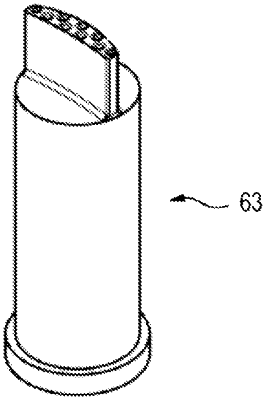| CPC B22F 3/12 (2013.01) [B22F 7/08 (2013.01); B22F 2005/001 (2013.01); B22F 2207/13 (2013.01)] | 4 Claims |

|
1. A method for producing a machining segment for a machining tool, wherein the machining segment is connectable to a basic body of the machining tool by an underside of the machining segment, comprising the steps of:
producing a green body by placing first hard material particles in a matrix material in a defined particle pattern, wherein the first hard material particles are placed in the matrix material with a respective projection with respect to the matrix material;
compacting the green body by pressure between a first press punch, which forms the underside, and a second press punch, which forms an upper side of the machining segment, to form a compact body, wherein the upper side is opposite from the underside, wherein the second press punch has depressions in a pressing surface, wherein an arrangement of the depressions corresponds to the defined particle pattern of the first hard material particles, wherein a respective projection of the first hard material particles is received within a respective depression in the pressing surface of the second press punch during the compacting, and wherein there is no direct contact between the first hard material particles and the second press punch; and
processing the compact body by temperature or by infiltration to produce the machining segment.
|